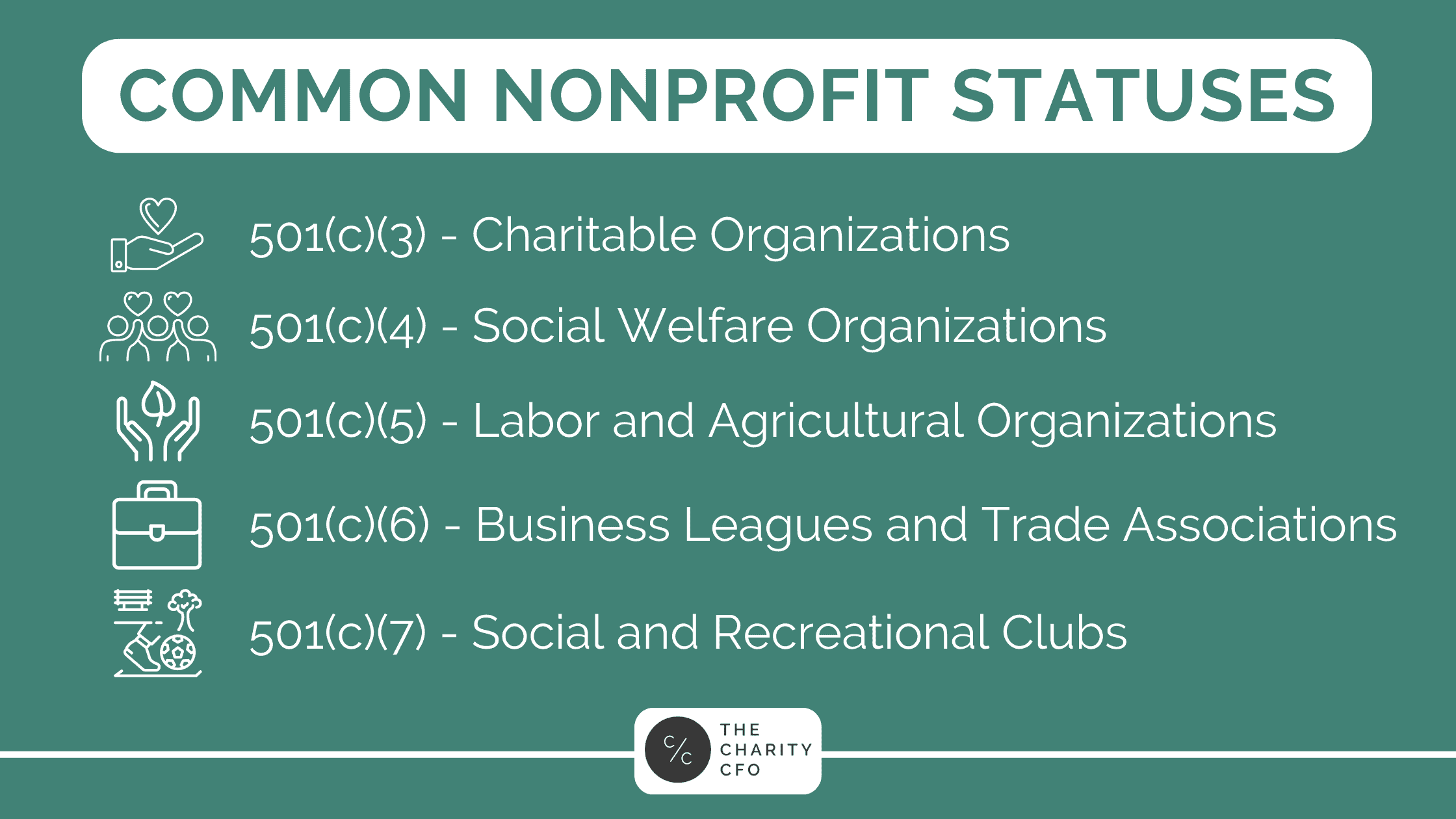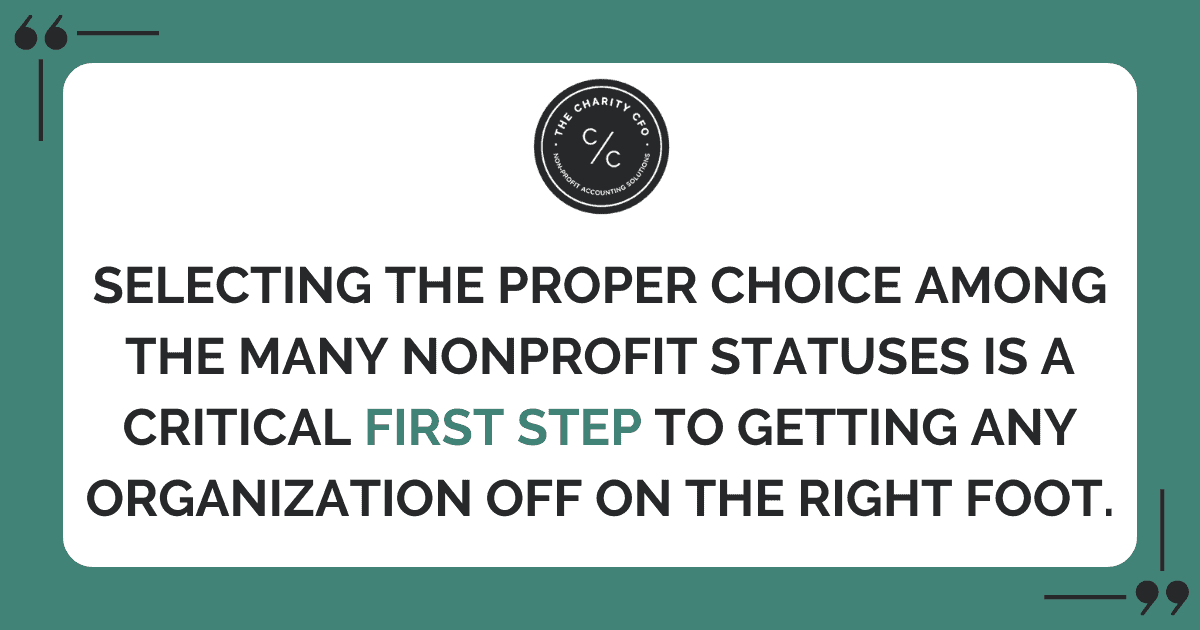Nonprofit Statuses: 501(c)(3) vs 501(c)(4) and more!
To outsiders, it’s often assumed that all any nonprofit status is basically the same. But those starting and operating these critical organizations know there’s much more to the various nonprofit statuses, with varying rules and qualifications for each.
So what do you need to know about the differences between nonprofit statuses? Let’s take a closer look.

What Does it Mean to Have a Nonprofit Status?
Two things typically distinguish nonprofits from other organizations.
Their goal
-
- Unlike typical businesses, nonprofits aren’t set up to bring in profits for owners and investors. Instead, they’re designed to help people, advocate for an issue or goal, or conduct other activities to benefit members or other groups. While they bring in money via fundraising and other sources, that money is reinvested directly back into the organization to support its mission. This charitable goal is what leads to the other distinguishing factor.
Their tax status
-
- Qualified nonprofits typically receive significant tax benefits or breaks federally, and are often exempt from or have limited state taxes as well. In return, nonprofits need to abide by sometimes strict rules regarding financial transparency, governance, and other regulatory issues.
What’s the Difference Between 501(c)(3) vs 501(c)(4) and other statuses?
While they may work similarly in a variety of ways, there are vital differences between statuses.
- The organization’s purpose can dictate which status is applicable (as can other eligibility issues).
- Certain activities can only be legally conducted by nonprofits of a certain status.
- There are critical differences in tax benefits, which are key to how an organization operates.
What’s the Difference Between an NPO and an NFPO?
In general usage, NPO (short for nonprofit organization) and NFPO (not-for-profit organization) are often used interchangeably. However, they do have a vital technical difference that can determine which category your organization falls under.
NPOs are more strictly required to operate in the public interest, like charity work or furthering a cause or issue. There’s no such restriction for NFPOs, which can also include:
- Sports or social clubs
- Professional organizations
- Homeowners associations
- Etc.
However, NFPOs must still reinvest any surplus to take advantage of tax and other benefits.
Common Nonprofit Statuses
With all this in mind, new and future nonprofit leaders may wonder which status fits their organization. Here’s what you need to know.
501(c)(3) – Charitable Organizations
501(c)(3) organizations are the most common charitable group. They’re focused on “public good” activities, like:
- Educational
- Scientific
- Religious
- Sports
- Public safety
- Etc.
Federal tax law gives these groups an advantage by making donations to them tax-deductible, allowing donors to reduce their tax liability while helping these nonprofits stay afloat. However, this strictly prohibits them from taking political stands or engaging in politics.
501(c)(4) – Social Welfare Organizations
As their name suggests, 501(c)(4) groups work to improve social and living conditions for people. This can cover a wide range of activities, from:
- Helping less fortunate community members
- Hosting educational courses
- Helping mediate area disputes
- Fighting neighborhood deterioration
They can also advocate for public policies and laws that benefit the people they serve, as long as this isn’t their primary or sole activity. As a result, donations to 501(c)(4)s aren’t tax deductible for donors.
501(c)(5) – Labor and Agricultural Organizations
501(c)(5)s are formed to advocate for better conditions for workers, as well as improve agricultural products and help promote associated industries. This category includes labor unions and groups that advocate for farmers, livestock and dairy producers, and others.
These groups naturally have a significant interest in public policy related to their industries, so they’re allowed by law to advocate for policies and get involved in political issues. However, once again, this can’t be their primary mission, and donations are not tax-deductible.
501(c)(6) – Business Leagues and Trade Associations
501(c)(6) organizations sit at a unique crossroads of the for-profit and nonprofit worlds. They consist of:
- Business groups
- Chambers of commerce
- Boards of trade
- Real estate groups
- Etc.
While these organizations don’t work for profit themselves, they advocate for better business conditions and policies for specific industries, types of companies, or geographic areas.
They have even fewer restrictions than other nonprofits when it comes to political activity and advocacy in their area of business, but it still can’t be their primary purpose. Naturally, 501(c)(6) donations are not tax-deductible.
501(c)(7) – Social and Recreational Clubs
The final category of nonprofits, as far as the feds are concerned, are 501(c)(7) groups, which cover social and recreational clubs. These groups collect funds from members via fees and other methods and operate strictly for fun and social purposes, with no significant external activities. Some examples include:
- Country clubs
- Yacht clubs
- Swim clubs
- Fraternal organizations
- Amateur sports leagues
Their tax-free treatment hinges on not receiving any significant income from non-members or outside business. Typically, these groups engage in little, if any, political activity but still aren’t tax-deductible due to their lack of public benefits.
Seek Professional Guidance When Selecting Nonprofit Statuses
Selecting the proper choice among the many nonprofit statuses is a critical first step to getting any organization off on the right foot. Making the wrong move here can lead to significant tax troubles down the road.
Fortunately, The Charity CFO can offer a helping hand on the financial decision-making side of things. Our skilled financial professionals will help you assess your situation, plot your future financial plans, and make a choice that will form a solid foundation for years of nonprofit work to come.
Contact us today to learn more and get started!







